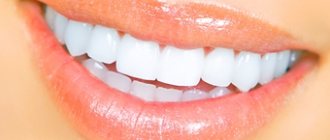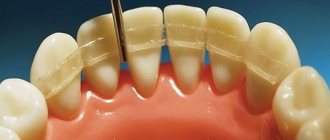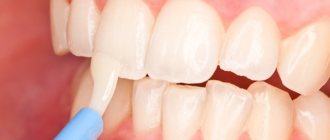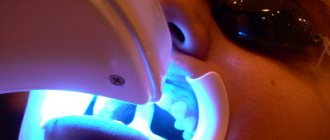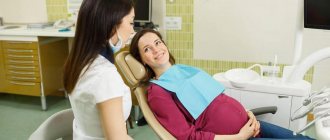What are the causes of the numerous problems with teeth and gums that expectant mothers suffer from? How can they maintain a healthy smile, and can they be treated by a dentist during pregnancy? We answer the most important questions about pregnancy and teeth.
Dentists at appointments often hear the same story from patients: “Doctor, my teeth started to fall out during (after) pregnancy.” Many women have the feeling that during intrauterine development the child “takes” calcium from the mother’s teeth, causing caries and gum disease.
In fact, this is a myth that has no scientific evidence. The calcium reserves necessary for the baby's development are not replenished by the mother's teeth. Why then do dental problems worsen during pregnancy?
What happens to teeth and gums during pregnancy?
Most often during this period, women complain of an exacerbation of diseases such as caries, gingivitis, and periodontitis. Each of them can lead to tooth loss if not treated promptly.
Toxicosis can also become a catalyst for carious processes. Nausea and vomiting, as well as changes in eating habits (large amounts of carbohydrates) cause disruption of the acid-base balance in the oral cavity, demineralization of teeth and the development of caries. If you do not sanitize the oral cavity before pregnancy, even minor carious lesions can turn into large lesions within nine months.
During pregnancy, hormonal levels (estrogen and progesterone levels) change and immunity decreases, which can lead to disruption of the gums' response to plaque formation. By leaving ordinary plaque unattended and untreated, you risk causing it to degenerate into tartar, which can damage the entire tooth.
Plaque also causes the development of gingivitis, an infection of the oral mucosa that causes swelling, redness, and bleeding of the gums. Due to altered hormonal levels, any inflammatory reaction in the body of the expectant mother is more violent, which is why the disease is otherwise called “hypertrophic gingivitis” or “gingivitis of pregnant women.” If it is not cured, it can develop into periodontitis, which means that gradual resorption or loss of bone tissue, suppuration of gum pockets and tooth mobility will be added to the listed symptoms.
However, it is still not worth linking a sharp deterioration in oral health with pregnancy. If you maintained proper oral hygiene before pregnancy, regularly attended preventive examinations and had professional cleanings every six months, then all of the problems listed above will most likely not affect you.
It’s another matter if you have never removed dental plaque and have not treated caries. Even if they practically didn’t bother you before pregnancy, during pregnancy the previously “acquired” problems will most likely worsen.
Early and late dental treatment
Dental treatment during pregnancy is a responsible and dangerous procedure, since the dentist’s actions affect not only women’s health, but also the condition of the developing embryo.
1st trimester
From the point of view of gynecologists, the first trimester is the most dangerous time for a developing baby, since this is when its main organs and systems are formed. In addition, in the first three months a developing baby undergoes:
- division with maturation of the egg membranes;
- formation of vessels feeding the fetus;
- formation of protective shells;
- the appearance of embryonic tissues with internal organs.
The dental intervention performed can affect the development of the child’s internal systems, aggravating their condition. Therefore, certain types of dental diseases can be “endured” until the baby is born. Such indications include:
- initial stages of pulpitis;
- chronic periodontitis;
- uncomplicated caries.
If, however, an exacerbation of the disease occurs and emergency dental care is necessary, gentle dental anesthesia is used during pregnancy.
2nd trimester
It is possible to treat bad teeth in the second trimester of pregnancy in most cases compared to the first months. The reason for this is the presence of the baby’s formed organs and their further growth. However, for each case, dentists individually select the necessary anti-inflammatory and analgesic medications.
At the stage of the second trimester, it is allowed to carry out a professional type of oral hygiene with accompanying prophylaxis. The use of drug treatment with x-rays is allowed only in case of exacerbation and increase in frequency of toothaches.
3rd trimester
Pregnant women in the third trimester are allowed to visit the dental office only in cases of extreme necessity. The reason for this is the adrenaline content in the anesthesia used by doctors, the activity of which can lead to premature birth.
4th trimester
At this stage, pregnant women should also have their teeth treated if emergency pain occurs, since the introduction of certain medications into the body can cause unwanted uterine tone with subsequent delivery. In other cases, it is advisable to wait until the baby is born, after which you can begin therapeutic procedures using gentle medications.
Can a mother’s “dental” diseases affect the baby’s health?
Sick teeth and inflamed gums are a source of infection for the entire body. From the carious cavity, microbes can penetrate through the root canal into the blood and even provoke disturbances in the functioning of internal organs (heart, kidneys, etc.).
In addition, recent studies suggest that premature birth and the birth of low-weight children may be associated, among other things, with gum disease - an infection in the mother’s body can adversely affect the child’s health. Therefore, preventive dental examinations are extremely important for the health of both the child and the mother.
FAQ
How does pregnancy affect the condition of teeth?
The effect of pregnancy on teeth is reflected in the deterioration of their general condition. The baby developing inside takes most of the calcium from the mother's body to form its skeletal system. As a result, a deficiency of calcium compounds leads to weakening of tooth structures, and as a result, their “crumbling” begins.
Are X-rays allowed for pregnant women?
Dental treatment during pregnancy using radiography can cause mutational changes in the body. It is especially dangerous to do such a procedure in the early periods of gestation (1st trimester). X-rays are allowed at a later date if there are appropriate indications and when the benefit to the mother outweighs the risk of danger to the baby developing inside her
When to visit the dentist and what procedures are allowed?
The best option is to solve all dental problems and have professional cleaning done in advance, before planning a pregnancy, in order to minimize possible risks. But if you have started the situation, and dental treatment during pregnancy cannot be avoided, then you should remember the precautions.
Thus, in the first and third trimesters, you should limit yourself to only urgently necessary procedures, be sure to consult with your gynecologist about anesthesia or taking medications. Based on these recommendations, your dentist should determine the need for hygienic teeth cleaning and therapeutic treatment in the first trimester.
The safest time for dental treatment is the second trimester (14 to 26 weeks). At this stage, all manipulations can be carried out - taking precautions, of course. However, if possible, it is better to avoid introducing pharmaceutical drugs into a woman's body.
During pregnancy, it is highly recommended not to undergo procedures such as implantation and prosthetics, resort to surgical treatment, or remove tartar. This is due to the use of anesthesia.
Women are allowed to treat caries during pregnancy and periodontal diseases, inflammatory processes in the gums and teeth, tooth extraction (non-surgical), and installation of braces (if there is no tooth mobility).
Is it possible to have x-rays and anesthesia during pregnancy?
Many experts, including those from the American Dental Association, note that if you can avoid X-rays during pregnancy, then it is better to play it safe and refuse this type of diagnosis. The same applies to anesthesia.
However, if x-rays and anesthesia are still necessary, you should resort to them in the second trimester, because in the first trimester, the formation of the baby’s vital organs occurs, and in the third, it is already physically difficult for a woman to perform any procedures. When choosing an anesthetic drug, your dentist should choose anesthetics with minimal amounts of epinephrine.
As for x-rays, the type of examination officially approved for pregnant women and nursing mothers is diagnostics using a dental computed tomograph. The radiation exposure in this case is minimal. In addition, the device gives the doctor the opportunity to accurately identify problems at the earliest stages of diseases, which helps to avoid diagnostic errors and complications.
Advertising
You can treat teeth during pregnancy with anesthesia
Modern dentistry recommends resorting to therapeutic intervention only for acute toothache. It is advisable to do this during the second trimester. If the pain that occurs is periodic and unbearable, you should definitely visit a doctor. You should also visit the dental office if you have the following problems:
- worsened pulpitis;
- infectious periodontitis;
- progressive caries.
The listed diseases are characterized by the penetration of cariogenic microorganisms into the blood that can increase the release of adrenaline. The latter stimulates uterine activity, causing premature birth. As a result, a child may be born earlier than planned and with insufficient body weight.
How to care for your teeth during pregnancy?
- Limit your consumption of carbohydrates and sweets - they provoke tooth decay.
- Replace sodas with water or low-fat milk and fruit juices with fruit.
- Brush your teeth with fluoride toothpaste and floss twice a day. Special pastes with sage, chamomile, and mint, which have an anti-inflammatory effect, are also effective.
- For frequent attacks of nausea and vomiting, chewing gum without sugar or with xylitol will help you, as well as rinsing your mouth with a soda solution after an attack (1 teaspoon of soda per glass of water). This will neutralize the negative effects of acids on enamel.
So, so that diseases of the teeth and gums do not overshadow the most important period in a woman’s life, you should prepare for it in advance - go to the dentist, get rid of caries and inflammatory gum diseases, and also regularly undergo professional hygienic cleaning.
Oral hygiene during pregnancy
The low level of knowledge of the rules of oral hygiene in young women prevents the timely elimination of foci of chronic inflammation, which leads to a high prevalence of complications during pregnancy. The following rules help preserve your dental health and the health of your unborn child:
- regular dental examinations at least three times during pregnancy (every trimester);
- professional hygiene;
- therapeutic sanitation of the oral cavity;
- correction of individual hygiene, including training in the correct technique of brushing teeth;
- selection of individual oral hygiene products [1].
Daily care rules:
- It is recommended to brush your teeth with toothpaste and a toothbrush individually selected by your dentist.
- Use dental floss to clean between teeth and along the gum line. This will remove plaque and reduce the risk of inflammation.
- If it is not possible to brush your teeth due to toxicosis, use a mouth rinse, including after meals.
- Brush your teeth properly 2 times a day for at least 2 minutes. Start from the upper jaw on the left, from the buccal surface of the teeth. Sweeping movements - from the gum to the cutting edge of the tooth.
- Use a waterpik to effectively remove food debris.
Maintain your health by taking good oral care.
List of sources
1. Assessment of dental status and development of a complex of individual oral hygiene in pregnant women with diabetes mellitus. Dissertation for the academic degree of Candidate of Medical Sciences, A. A. Aleksandrov, Federal State Budgetary Educational Institution of Higher Education First St. Petersburg State Medical University named after. Academician I. P. Pavlova, 2022 // URL: https://vmeda.mil.ru/upload/site56/document_file/f2IsyYLUBd.pdf (access date: 08/07/2020).
2. The state of somatic and dental health in pregnant women, Ermukhanova G. T., Sharifkanova M. N., Oradova A. Sh., Ramankulova L. S., KazNMU, 2013 // URL: https://kaznmu.kz/ press/2013/05/28/somatic-and-dental condition/ (date of access: 08/07/2020).
3. Prescription of vitamins during pregnancy, Borisova E. O., General Medicine, 3.2010 // URL: https://cyberleninka.ru/article/n/naznachenie-vitaminov-vo-vremya-beremennosti/viewer (access date: 07.08 .2020).
